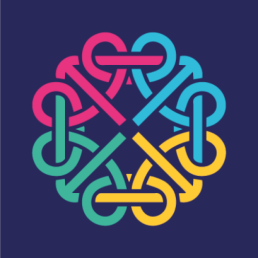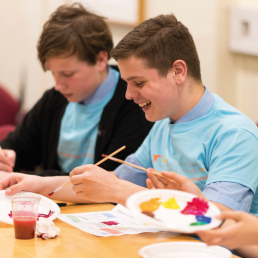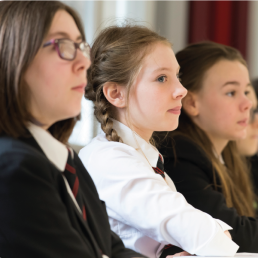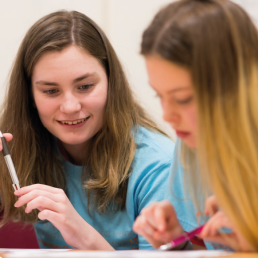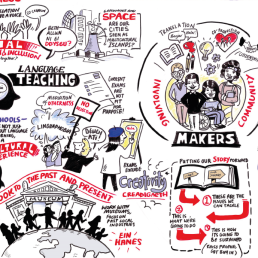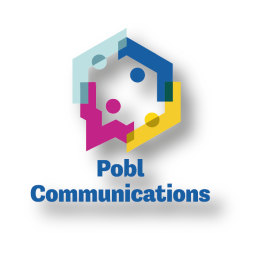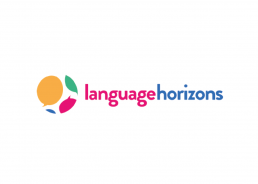MFL Mentoring goes to Brussels
The Ambassador’s Residence was full of people who all had a connection to Wales and over the course of the evening, we managed to speak to near enough everyone there. The First Minister, Mark Drakeford, started the evening off with a speech welcoming everyone to the event and highlighting what Wales has to offer to the rest of the world. From speaking to the First Minister, we found out that his degree was in Latin. We all enjoyed delicious food and drink which was produced and farmed in Wales, from oysters and gin to lamb and cheese. We spent an enjoyable evening, talking to the other guests, promoting and celebrating the success of the project while also making many new connections. It’s amazing where learning languages can take you.
We started the next day with a breakfast of croissants and pain au chocolat before walking to Rond-point Robert Schuman which is where you’ll find one of the European Commission buildings and the European Council. We were heading to another building on the roundabout: Wales House – Ty Cymru. We went to the Welsh Higher Education Brussels offices where we took part in inspiring workshops.
The first workshop of the day was ‘Using visuals in languages classrooms’ by Claire Gorrara, a Professor of French at Cardiff University and Academic Lead for MFL Mentoring. This explored the use of analysing images in a language lesson to help pupils with the new layout of the GCSE languages speaking exam where they will have to build a discussion with the examiner around an image, for example, a group of friends eating burgers which would perhaps lead on to discussing healthy living.
The second workshop was ‘MFL resources to scaffold learning’ led by Sian Brooks, a lecturer in PGCE Secondary MFL at University of Wales Trinity St David’s. In this workshop, we looked at many different types of activities that would instil confidence in a language learner such as answering questions about a text in Icelandic but being able to get the gist of the text from knowing English and other foreign languages. With these activities, it wouldn’t feel like you were learning because they were so much fun.
The final workshop of the day focused on translation in a mentor session and was led by Tallulah Machin, a MA translation graduate, and Regional Coordinator of Language Horizons. This workshop looked at how translation can be presented in a way that doesn’t always show the full picture of translation and that there are many fun aspects to translation.
After the workshops, some of us explored a bit more of Brussels while those who were part of the Castilla y León mentoring project stayed behind for a planning session. We met at the European Parliament for a talk about how the European Union was formed and how the European Parliament is run. We then went to see the Hemicycle which is where all the MEPs come once a month to spend the day voting on important orders of business.
As the sun was setting, we made our way to the city centre for dinner at a traditional Belgium restaurant. Many of us had the classic moules frites. We were just a stone’s throw away from the Grand Place, the main square in the city, so we made the diversion on our way back to see this famous square at night with the gold on the buildings twinkling in the lights.
On our final morning in Brussels, we made a quick dash back to the centre and this time, saw the Grand Place in daylight. Before too long, it was time to leave Brussels, but everyone left with plenty of motivation to carry on promoting languages and the MFL Mentoring ethos. These couple of days in Brussels, a multilingual city, highlighted once again the importance of language learning and the places that languages can take you.
Jessica completed a BA Modern Languages, Translation and Interpreting at Swansea University, graduating in 2018.
Language Learning Opens Doors to Other Worlds: Memory Acts through Digital Technologies
Jonny O'Rourke
Author: Lucy Jenkins
Published: 10th April 2019
Summary of research: To understand the applicability of the Digi-Languages and mentoring methodologies implemented by MFL Mentoring in Wales to wider languages communities, above all, in European partner countries.
Funder: AHRC Languages Acts and Worldmaking – November 2018
Summary of outcomes:
- Presentation of outreach projects at APPG for Modern Languages in October 2018. This event involved mentors, mentees and teachers involved in the project from across Wales.
- Meetings with European colleagues at the Welsh Higher Education Bureau (WHEB) in November 2018 which resulted in a partnership between Cardiff University’s School of Modern Languages and the Castilla y León Regional Government. This resulted in eight final-year undergraduate students being recruited and trained to mentor in Spain as part of a final-year module, the Student Teaching Module. Click here for more info.
- Invitation to attend the Welsh Government St. David’s Day celebration event in Brussels (March 2019) with the First Minister of Wales. Representatives from the MFL Mentoring, colleagues from Physics Mentoring, students engaged in the Castilla y León project and colleagues representing Language Horizons all attended. Click here for more info.
Follow @2210Lucy on Twitter.
Evaluating the Effectiveness of E-mentoring as a Digital Languages Resource for FLL in Wales
Jonny O'Rourke
Author: Lucy Jenkins
Published: 27th January 2019
Summary of research: An evaluation of Digi-Languages, an online experience which encourages its users, year 8 or 9 learners, to engage in questions which challenge mono-lingual and mono-cultural perceptions. This experience takes a blended approach to mentoring, as an online and face-to-face activity and was developed by MFL Mentoring in 2017.
Funder: AHRC Open World Research Initiative – Multilingualism: Empowering Individuals, Transforming Societies (MEITS) – January 2018
Summary of outcomes:
- 3-minute film for OWRI pop-up museum which was launched at the end of 2019. Click here to view.
- Policy report by Gorrara, Jenkins and Mosley: ‘Modern Languages and Mentoring: Supporting Digital Learning across Language Communities in Wales’. This was published on the MEITS website and offered to Welsh Government. Click here to view.
- Policy paper by Gorrara, Jenkins and Mosley: ‘Modern languages and mentoring: Lessons from digital learning in Wales’, published in the Languages, Society & Policy Journal. Click here to view.
- Stakeholder workshop on outcomes of first iteration of Digi-Languages in May 2018 with Welsh Government and Department for Education (England) in attendance. This began discussions about how the Department for Education may look to fund a similar project in England to support their ambition to have 75% of students studying an MFL at GCSE by 2022 and 90% by 2025. MFL Mentoring later won a contract of £100k to deliver the Language Horizons pilot in November 2018 and then went on to deliver a larger project 2019-2020. Click here to view.
Follow @2210Lucy on Twitter.
Digital Languages Writing Sprint
Jonny O'Rourke
Author: Lucy Jenkins
Published: 13th August 2019.
Summary of research: The Digital Modern Languages tutorial writing sprint is a physical and virtual event designed to create a variety of open educational resources demonstrating the critical and applied use of digital tools and methods for teachers, learners and researchers interested in modern languages and cultures. This initiative is led by the ‘Digital Mediations’ strand of Language Acts & Worldmaking, which explores interactions and tensions between digital culture and modern languages research. Click here for more info.
Funder: AHRC Open World Research Initiative – Multilingualism: Empowering Individuals, Transforming Societies (MEITS) – July 2019
Summary of outcomes:
1. Jenkins, L. 2020. Preface. ‘Special Collection Critical Digital Pedagogies in Modern Languages – a Tutorial’. Modern Languages Open. Click here to view.
Follow @2210Lucy on Twitter.
Body Languages: Drawing Your Multilingual Self
Jonny O'Rourke
Author: Lucy Jenkins
Published: 5th December 2019
Summary of research: This event built on work by MFL Mentoring to explore the theme of the multilingual self. It included a pupil workshop with activities focused on exploring the relationship between identity and language. Creative research methods were used to research how pupils view their multilingual selves. The event concluded with a roundtable discussion involving teachers who have participated in the project for two or more years to examine the wider impact that the project has had on the school body and culture.
Funder: Economic and Social Research Council – June 2019
Summary of outcomes:
1. Workshop with Willows High School. The findings from this workshop about how pupils conceive themselves as linguists have been fed into an article for British Educational Research Association written by Gorrara, Jenkins, Jepson, and Machin 2020. ‘Multilingual perspectives: preparing for language learning in the new curriculum for Wales’, The Curriculum Journal, special issue, ‘Re-educating the nation: the development of the new curriculum in Wales’ (April 2020). Click here to view.
2. Workshop with teachers from secondary schools involved in MFL Mentoring for two or more years. The outcomes from this workshop were used as evidence for the external evaluation conducted in 2019, to evaluate the impact of the project on wider school cultures and approaches to languages, when a school has engaged over an extended period of time.
Follow @2210Lucy on Twitter.
Rethinking the Languages Pipeline in the Age of Brexit
Jonny O'Rourke
Author: Lucy Jenkins
Published: 17th January 2020
Summary of research: To investigate the factors impacting on the decline of language learning in the UK and champion new partnership models for the promotion of linguistic and cultural diversity. The event aims to challenge the assumptions underpinning populist denigrations of multiculturalism in the UK, magnified by Brexit, and contributes to debates on the future of modern languages as a discipline and field.
Funder: AHRC Languages Acts and Worldmaking – September 2019
Summary of outcomes:
1. Languages summit hosted in Cardiff on 27th September 2019. Funded by a small grant from ‘Languages Acts and World-making’, GW4 Consortium and Routes into Languages Cymru, this event discussed the challenges facing languages from primary school to university and across England and Wales. Increasingly, students are opting out of studying a language, often unaware of what they will lose (or never encounter) as a result of such a decision. Multilingualism is an integral part of our everyday lives and allows us to communicate, interact and learn from others beyond our linguistic community. The openness that this promotes is needed more so than ever in an era of Brexit. The event aimed to bring together key language stakeholders involved in a student’s language journey to reflect and consider how we might reconfigure the language landscape in the UK to make language learning more appealing to young people.
2. A graphic illustration of the outcomes from the Languages Summit.
3. Article for British Educational Research Association written by Gorrara, Jenkins, Jepson and Machin 2020. ‘Multilingual perspectives: preparing for language learning in the new curriculum for Wales’, The Curriculum Journal, special issue, ‘Re-educating the nation: the development of the new curriculum in Wales’ (April 2020). Click here to view.
Follow @2210Lucy on Twitter.
Pobl Communications: A Social Sciences Venture
Jonny O'Rourke
Author: Lucy Jenkins
Published: 15th May 2021
Summary of research: To investigate the potential for the development of a commercial venture from the research conducted by MFL Mentoring in order to grow and develop its activities. This activity directly links to and complements work being undertaken to consider the commercial pathways for the project via the ASPECT ARC (Aspect Research Commercialisation) Programme. This is a prestigious and first-of-its-kind accelerator for social sciences, offering vital training and support for researchers to help facilitate progression of innovative ideas through to translation and venture creation. You can read more about this here.
MFL Mentoring is currently looking for ways to sustain and scale-up its activity to allow it to deliver its inspirational activities in multiple contexts and with a variety of partners. This is following its success in developing multiple other ventures such as Languages Horizons and the partnership with Castilla y León.
Funder: Cardiff University ESRC Impact Acceleration Account – April 2021
Summary of outcomes:
1. The development of Pobl Communications, a new brand identity for the venture. The new branding will be available shortly.
2. The commissioning of Oxentia to conduct market research to identify the market scope for the activities of the venture. This includes looking further at the UK education sector, the global education sector and at the corporate training sector. Findings from this report will be available shortly.
Follow @2210Lucy on Twitter.
Language Horizons

Language Horizons.
Author: Lucy Jenkins
Published: 10th September 2020
Language Horizons (LH) was an ambitious and innovative project that harnessed the power of mentoring to inspire curiosity for languages and cultures in learners aged 12-14 (year 8 and year 9). The key aim was to translate that seed of curiosity and enthusiasm into a desire to take languages at GCSE. The idea for the project draws on the hugely successful MFL Mentoring project which has been running in Wales since 2015.
Language Horizons was funded by the Department for Education, England, and led by Cardiff University following successful bidding in two competitive tender rounds (2018 and 2019). With the core aim of increasing the number of learners taking languages for GCSE in England, the project was tasked with designing, implementing, and evaluating the success of a blended mentoring project for a new context.
Mission and Vision
The project sought to achieve its aims by:
• highlighting the benefits of learning a language at GCSE, A-level and degree level.
• raising expectations, improving motivation and strengthening the persistence and personal resilience of learners studying languages.
• creating sustainable links between higher education modern languages departments and partner secondary schools.
• offering classroom experiences and opportunities to language undergraduate and postgraduate students, with a view to encouraging a greater number to consider teaching and education, and to mobilise near-peer role-modelling to inspire learners.
• broadening the horizons and aspirations of learners by highlighting the wellbeing, career, and mobility opportunities available to those with language skills.
Language Horizons did not target learners studying a specified language but rather encouraged learners to be curious about all languages and cultures. It asked learners to challenge and question their perspectives and assumptions about others by validating a sense of multiplicity and multilingualism in the individual and in society. It endorsed the idea that everyone is part of a global community since no society is mono-lingual nor mono-cultural. It problematised the notion of a fixed identity and encouraged a view that being influenced by others, other languages, and other cultures, is additive not subtractive. Ultimately, it demonstrated that globality is a mindset, an outlook, and an attitude, as such it is not dependent on actual mobility and so is open to all, regardless of which language they are learning or of their proficiency. By approaching modern languages in this way, the project aimed to give learners agency over their language learning and their sense of who they are by creating an intrinsic motivation for language learning.
Implementation
The project worked solely with learners who indicated they were unsure about continuing with modern languages after Key Stage 3. Language Horizons used mentoring methodology to create a learner-centred relationship that provided space for questions and exploration in order to build confidence and signpost opportunities for learning. Mentoring is a different practice to teaching with the mentor playing a unique role in the life of the learner. The mentor’s goal is to help mentees form their own views, develop different perspectives, and grow as a person. This mentoring was conducted both face-to-face and online through a bespoke digital platform with built in chat capabilities. Online resources were designed and developed by the project team and created the stimulus for the online sessions and interactions. Mentors were trained to deliver the activities face-to-face and online.
Language Horizons ran between 2018 and 2020, and successfully delivered two full years of mentoring. In its first phase (2018-2019), Language Horizons established a partnership between the University of Sheffield and Sheffield Hallam University. In the larger subsequent phase (2019-2020), it grew to include The University of Warwick and Coventry University.
Outcomes
In its first phase, focused in South Yorkshire, the project worked with ten local schools and two hundred learners. All of the two hundred learners that participated during this phase had previously decided against languages. An external evaluation demonstrated that taking part in the mentoring sessions led to 53% of learners changing their mind and opting for a language GCSE. The success of the pilot led to it being refunded by the Department for Education to expand its reach in South Yorkshire and to establish a new hub in the West Midlands. This marked the advent of Phase 2.
Phase 2 of Language Horizons was a partnership between four universities in England and led by Cardiff University, Wales. Students from The University of Sheffield, Sheffield Hallam University, The University of Warwick, and Coventry University were trained to deliver mentoring sessions in two regions of England. During Phase 2, a total of 70 mentors mentored in 38 schools across both hubs. An external evaluation of the second year of the project found that 56% of the learners who took part in the five-week programme then went on to take modern languages for GCSE despite their prior uncertainty. This is against an average uptake of 46% across England and despite the complications brought about by Covid-19.
Unfortunately, funding for Language Horizons ceased in August 2020 following the evolving public health situation.
More information and further outcomes can be found in the external evaluation conducted in 2020. Click here to access it.
Follow @2210Lucy on Twitter.

